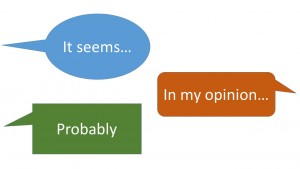Provisionality markers are the words we use when communicating that signal we are being provisional rather than absolute. Using them well is a crucial part of the practice of provisionality. On the recent Objectivity Training course, I was planning to include some discussion of provisionality markers in one session, and then failed to do so in much detail because I ran out of time. One of the participants remarked that it would have been useful to give it higher priority, given the great practical importance of provisionality markers. Reflecting further, I agree, so I’ve decided to write a blog about it to help make up for my omission.
You will probably need to know a bit about provisionality, and how it differs from absolutisation, to follow this. If you haven’t come across the term before, I’d suggest watching this video.
Provisionality markers consist in words or phrases that try to directly communicate that a statement being made is provisional, usually by linking it to appearance rather than reality, opinion rather than claimed fact, or probability rather than certainty. Here are some examples:
Appearance rather than reality
It seems…
Apparently
Evidently
Opinion rather than claimed fact
In my opinion…
I’d suggest…
On the whole I think…
In my view…
I think…
One might conclude that…
I believe…
Arguably…
Probability rather than certainty
…may…
…might…
Probably
It’s likely that…
The use of these terms is, of course, no guarantee that a person is being provisional. What make them provisional is their state of mind when they are making a judgement, and whether they are able to consider alternatives, not just whether they use these words. You’ll always need to judge provisionality from the context, rather than just from the use of these words, and they may be used formalistically, merely to try to avoid the possibility of offence, or because they are believed to be expected in the group. That judgement is obviously trickier on the internet, where the words are separated from information about tone and context.
In some cases the use of these terms may also indicate hesitancy or indecisiveness rather than provisionality. Indecisiveness should not be confused with provisionality, the difference being that provisionality involves taking as much into account as the conditions allow and then making a balanced judgement, whilst indecisiveness means failing to make a judgement when one is required. Indecisiveness may even often be accompanied by a negative absolute belief, such as that I can’t be justified in making a decision, or that decisions can’t ever be justified.
Nevertheless, I think the use of these terms (and others like them) can be very helpful. There are two aspects to the practice of using provisionality markers, obviously: using them ourselves and noting when others use them.
Using provisionality markers
Using them ourselves adds to the probability that others will recognise that we are trying to be provisional rather than absolute. That makes it more likely that a helpful discussion will ensue, because, if we disagree with each other, that makes it much more likely that we will consider and try to understand and assess each other’s positions rather than being defensive and ending up in conflict. Provisionality markers should set up whatever I am claiming for a discussion where we are both concerned with finding the most helpful outcome, rather than for an adversarial argument in which ‘winning’ or ‘losing’ is our main concern.
However, for provisionality markers to potentially have this effect, other people have to notice that we are using them. Thus it may help to give them extra emphasis in one way or another, particularly when communicating with someone whom you think might not notice or might not have noticed the markers. We can do this through tone of voice, or in text by using asterisks or other emphasising features.
Which markers we choose to use may also have an effect on whether they are noticed. Longer phrases like “One might conclude that…” may seem clumsy and over-formal, but have the advantage of going to great lengths to draw attention to provisionality. “I believe…”, on the other hand, may sometimes be intended as provisional, but (particularly in a religious context) is easily interpreted as dogmatic nevertheless.
The provisionality of the marker also needs to be consistent with the rest of what you are saying, and if the rest of your statement is absolute in form, no quantity of provisionality markers will rescue it. For example, it’s contradictory to say “It may be inevitable that you’ll find the right partner”: if it may be the case (rather than being a certainty), it can’t be inevitable. If you say “In my view conservatives are always greedy”, the over-certainty of your sweeping generalisation about conservatives is undermining the apparent provisionality of “in my view” to such an extent that your provisionality marker is likely to be deservedly ignored. It’s thus impossible to separate the use of provisionality markers from the wider issue of avoiding absolutes, which in turn requires some understanding of the wide variety of forms that absolutes can take so that you can avoid them.
Noting others’ use of provisionality markers
Just as important, however, as using provisionality markers oneself, is noticing when other people use them, and giving due weight to their intention to be provisional. This is related to the problem of people taking offence – something that they are responsible for as well as you. Even if you’re not inclined to enter into discussion of a claim that someone has made, if you recognise that they’re trying to do so provisionally, you can at least pass on without taking offence, recognising that a statement you disagreed with was probably part of someone else’s progression from a relatively ignorant position to a wiser one.
The crucial part of noting others’ provisionality markers is usually interpretation. Was the provisionality marker intended? Was the whole statement intended as provisional even despite the lack of provisionality markers? This is where I think the principle of charity is really helpful: this is the presumption, when in doubt, that a person had a more helpful rather than a less helpful intention. If you presume wrongly, after all, the outcome is much more likely to be helpful if you do so in a positive direction, and it’s likely to be become clearer in subsequent discussion whether or not the person was being genuinely provisional. The video below shows a variety of ambiguous situations where the principle of charity needs to be exercised!
One of my own bugbears online is having provisionality markers ignored, often by people who feel strongly about a particular view, and are eager to pigeonhole me either in the ‘for’ or ‘against’ camp in relation to that view, even when I want to suggest a third alternative. It’s easy to walk away from such heated debates (for example, about the EU in the current UK political climate) on the grounds that joining in may just lead to people taking offence and to unfruitful polarised discussion. At the same time, though, it is exactly such debates where provisionality and a critical perspective on over-simplifications are most needed. Making strong use of provisionality markers, recognising those of others, and also pointing them out robustly when others ignore them, may be important steps in making such discussions more productive.
Overall, then, the importance of provisionality markers, and of using them carefully, cannot be underestimated. In the end, however, their use cannot be separated from other Middle Way practices: provisionality, agnosticism, incrementality and integration.



